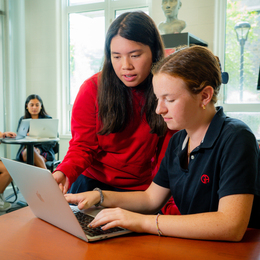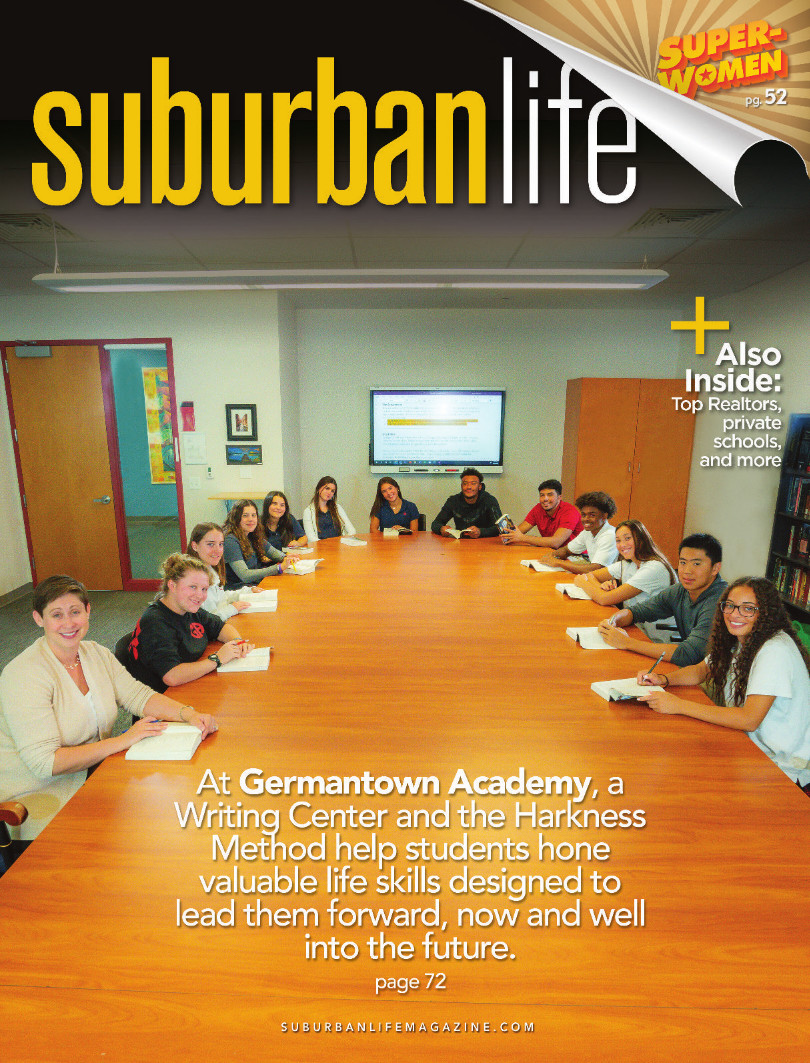
Inspired Start
The Writing Center at Germantown Academy helps students hone valuable life skills designed to lead them forward, now and well into the future.
Writing is a process, as the saying goes. Those who learn to master the process tend to realize the dividends of disciplined, clear-eyed communication—namely, an open door for opportunities in one’s education and career, as well as in life in general.
At Germantown Academy (GA), a prekindergarten-through-12 nonsectarian, independent, coeducational school in Fort Washington, an in-house, peer-staffed Writing Center encourages Upper School students to enhance their writing skills. Since 2006, teacher-nominated writing advisors from the junior and senior classes have helped their fellow students identify and address common writing problems, while at the same time teaching them important lessons about how to hone their craft.
“Our job is to elicit conversations to help the students with their writing and clarify what they want to say,” says Robynne Graffam, an Upper School English teacher and director of GA’s Writing Center. “Student writing advisors are trained to help their peers brainstorm and clarify what they’re trying to say without imposing their own ideas on the other students’ writing.”
While much of the work involves the mechanics of grammar and punctuation, Graffam says writing advisors also help their fellow students “identify those breakthrough moments when they discover a new insight or recognize how to express their point more clearly or effectively.”
“In addition to strong writers, we’re looking for responsible, kind, empathetic people who will be good partners in the writing process,” she adds. “Our staff members go through several hours of training before we put [writing advisors] to work with other students, and we meet every month for about two hours to build their skill sets, preview assignments they’re likely to encounter, or troubleshoot to help them do their jobs better.”
Students can work with an advisor for any type of writing project, whether it’s an English essay, a lab report, a foreign language assignment, a history paper, etc. Furthermore, students can seek assistance at any point in the writing process, from the initial brainstorming to the final review of a completed draft.
“As a faculty member, I have used the GA Writing Center as a client more than once,” says Rebecca Burnett, head of GA’s Upper School English department. “When I was in graduate school, I had an assignment in one class in particular to write very short pieces, which is not my strong suit as a writer. I had to work really hard at cutting my word counts down, and that meant really distilling my ideas. I turned to the Writing Center for help. I went in and brainstormed with a senior writing advisor to help get my thoughts together, identify what I wanted to say, and identify the main point. It was extraordinarily helpful.”
She often shares this anecdote with students to help them realize that anyone—even teachers—can benefit from these services. Also, she has seen the Writing Center help students who may be shy about asking for feedback from a teacher, because they perceive working with a peer as “less threatening.”
Peer support is also highlighted in GA’s Upper School English, history, Latin, and classics classes, all of which use a student-centered approach to teaching called the Harkness Method to help students explore and articulate their ideas during class sessions. In the Harkness Method, a large, oval-shaped Harkness Table designed to stimulate ideas, encourage healthy debates, and promote critical thinking.
“The hardest part of writing a good paper is coming up with a compelling thesis that’s worth arguing,” says Burnett. “The Harkness Table gives us a place to sit down and collectively think through our ideas together. It’s really remarkable to see the kids throwing out ideas and building each other up, deciding whether to develop their ideas further or go in a completely different direction. It’s a great way for them to begin practicing how to articulate their ideas and learning how to brainstorm in preparation to write a paper or defend an argument.”
Graffam sees the Harkness Table as an invaluable tool in fostering communication among students. After all, learning how to communicate clearly—via the written word or otherwise—will serve students well long after they have left GA for the last time.
“Now that more students have begun using the Writing Center as part of their writing process, we’re seeing fewer students putting together a draft and submitting it the next day,” she adds. “They’re learning how to seek out objective feedback in order to do their best work. They’re also developing valuable life skills that they can continue to leverage in the future.”
Germantown Academy
340 Morris Road
Fort Washington, PA 19034
(215) 646-3300
germantownacademy.net
340 Morris Road
Fort Washington, PA 19034
(215) 646-3300
germantownacademy.net
Photo by Jody Robinson
Published (and copyrighted) in Suburban Life, September 2022.



